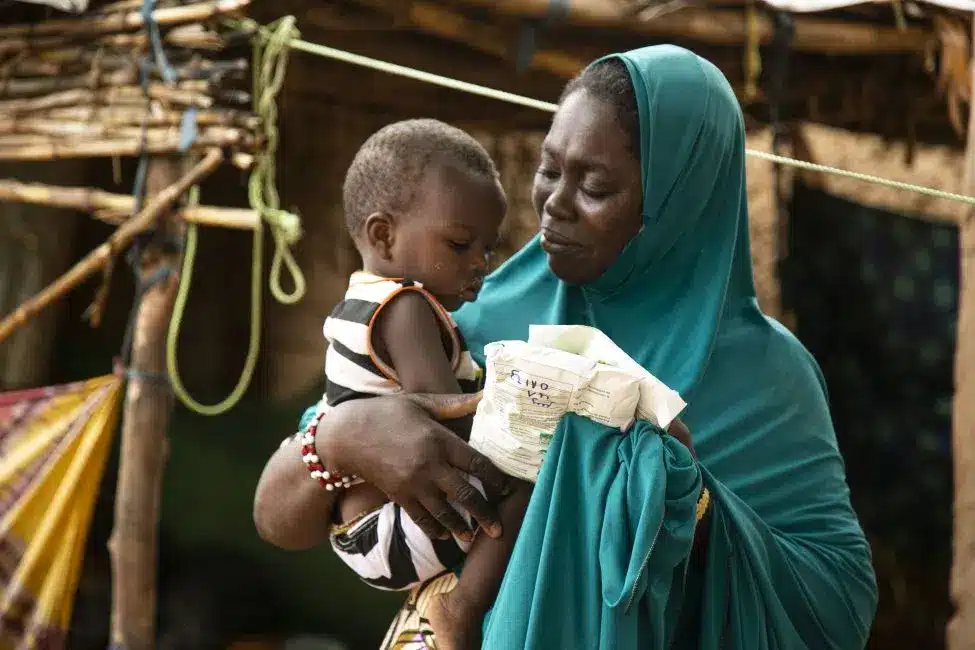In south-western Niger, whole families have been uprooted by armed conflicts and have been facing a serious food crisis for several months. With the support of the European Union, we distributed food kits to more than 1,000 families last summer in the Tillabéri region.
How does food distribution work in the volatile security situation in the Sahel, and what is its impact on the target populations? Djibo Mazou Boubacar, the coordinator of our humanitarian projects in Niger, reviews the operation with us.
What happens during a food distribution session?
“Everything has been designed to facilitate distribution, keep the people moving as smoothly as possible through the handout area and avoid crowd surges. If the population has not been properly prepared, there are risks of outbursts, because the needs are enormous, and our food kits are limited.
A few days beforehand, we draw up a handout plan and share it with village and neighbourhood leaders to avoid bottlenecks and control the crowd during distributions. In addition, we organise awareness-raising sessions to emphasise the need to respect the plan. We also use these sessions to inform the people selected of what the food kit they are going to receive will contain.
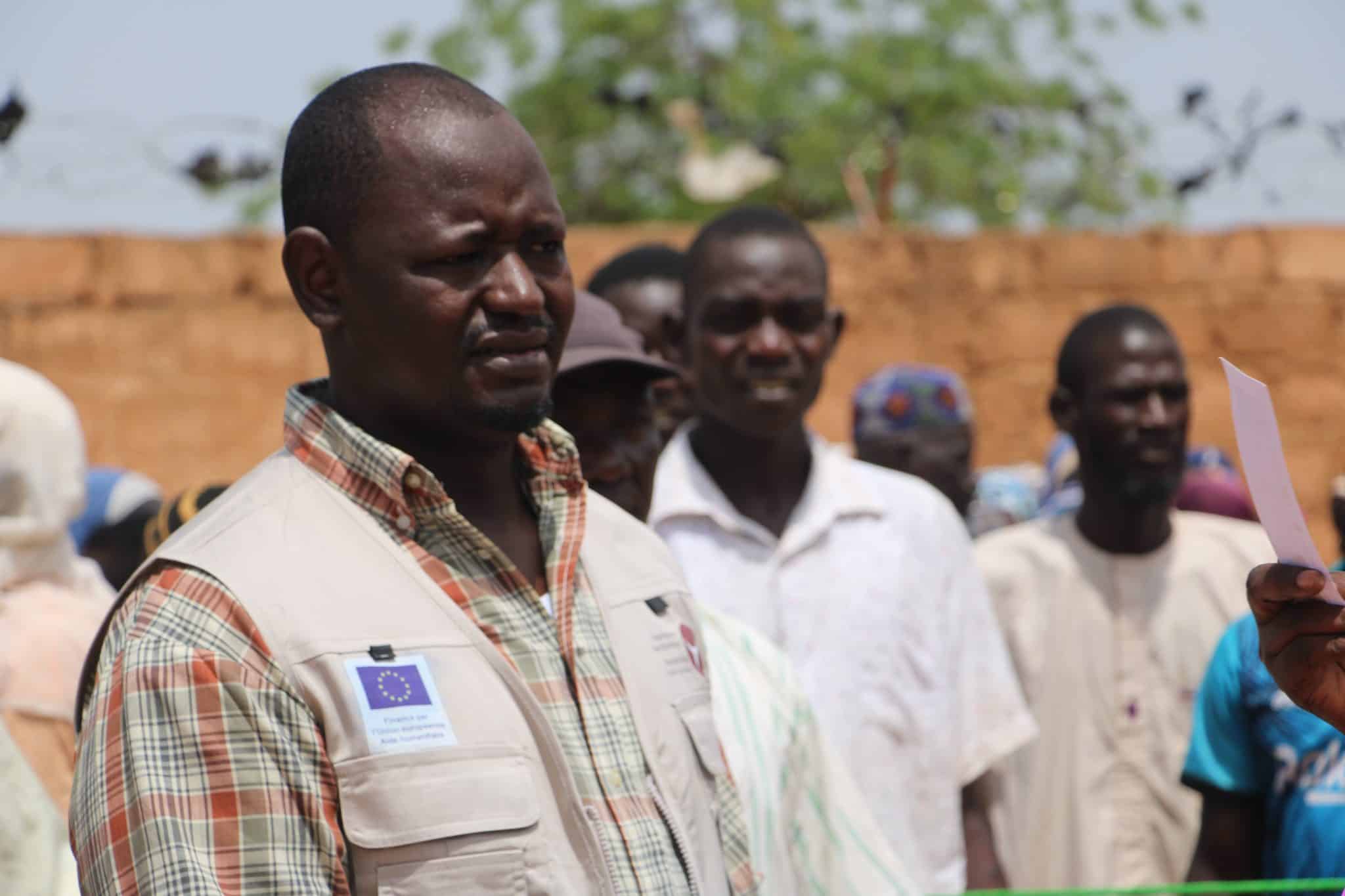
Djibo Mazou Boubacar, coordinator of humanitarian projects of Vétérinaires Sans Frontières Belgium in Niger, at a food distribution site in July 2022. ©2SCom
On the day itself, a security fence is erected to surround the food distributions. We also make tents available for the women and children to shelter from the sun. Representatives of the villages and displaced communities are present on site to calm things down if necessary. These people are seen as leaders by their communities: people respect and listen to them.
Each beneficiary receives three coupons: one for fruit, one for grain and one for sugar, milk and oil. Next, they exchange their coupons for food from each supplier. A cooking demonstration stand is also provided to show how to prepare vitamin-enriched flour for children.”
In the unstable setting that characterises the region, how do you keep the beneficiary populations safe during food distribution sessions?
“The distributions are planned in partnership with the local authorities, the departmental prefect and municipal governmental bodies. They are the ones who give us security advice. If the distribution is held in a village outside the principal village in the municipality, we work very early in the morning and leave as soon as possible to avoid any incidents. There, too, the work we do to prepare and inform the beneficiaries in advance is crucial to ensure that everything runs smoothly. Generally speaking, to improve security during distribution sessions, patrols are increasing their attention in the area. These good practices have enabled us to avoid all incidents to date.”
How are the beneficiaries selected? How do you make sure you don’t forget anyone?
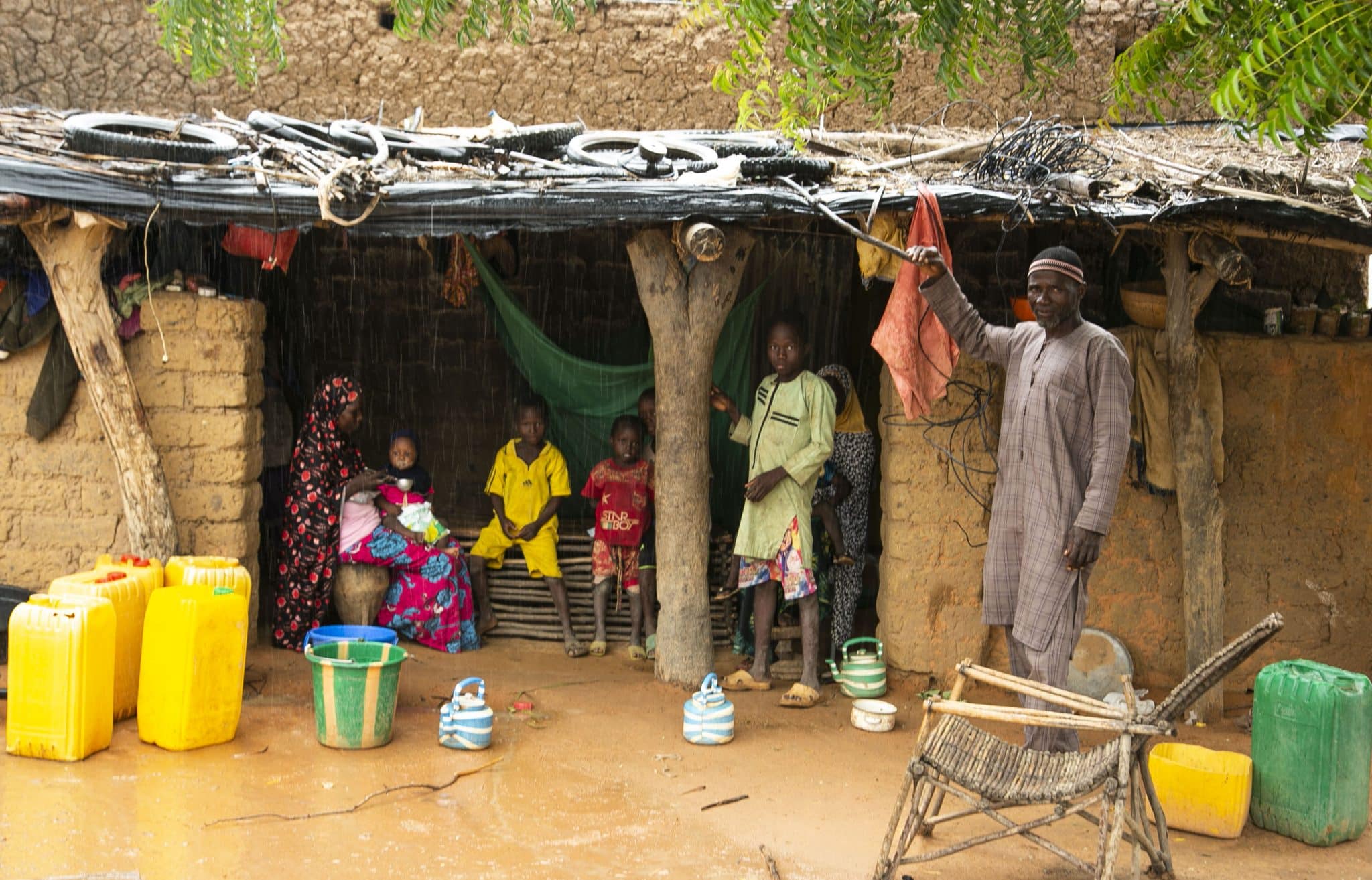
A family of internally displaced people receiving support from Vétérinaires Sans Frontières Belgium in south-western Niger, where they have found shelter. © 2SCOM
“The beneficiaries are selected from amongst the most vulnerable people in displaced populations, and also in the community that is hosting them. For example, we prioritise households led by single women or made up of pregnant or breastfeeding women, elderly or disabled people. Families from the host community who are sheltering many displaced people may also be taken into account. But socio-economic vulnerability remains the main criterion.
It does happen that people who meet these criteria arrive at the site after targeting. As far as possible, we try to help them too. We had one such case during a distribution session last summer: a woman who was not among the beneficiaries came to the distribution site with her child. They were hungry. As we had a few extra kits, we were able to give them one.
‘Leave no one behind’ is one of the basic principles of humanitarian aid. That also applies to people who are unable to come to the distribution site, whether because of a disability, an illness or any other reason. That involves setting up certain specific conditions, such as the distribution of rations to their homes.”
How does food aid improve these people’s lives?
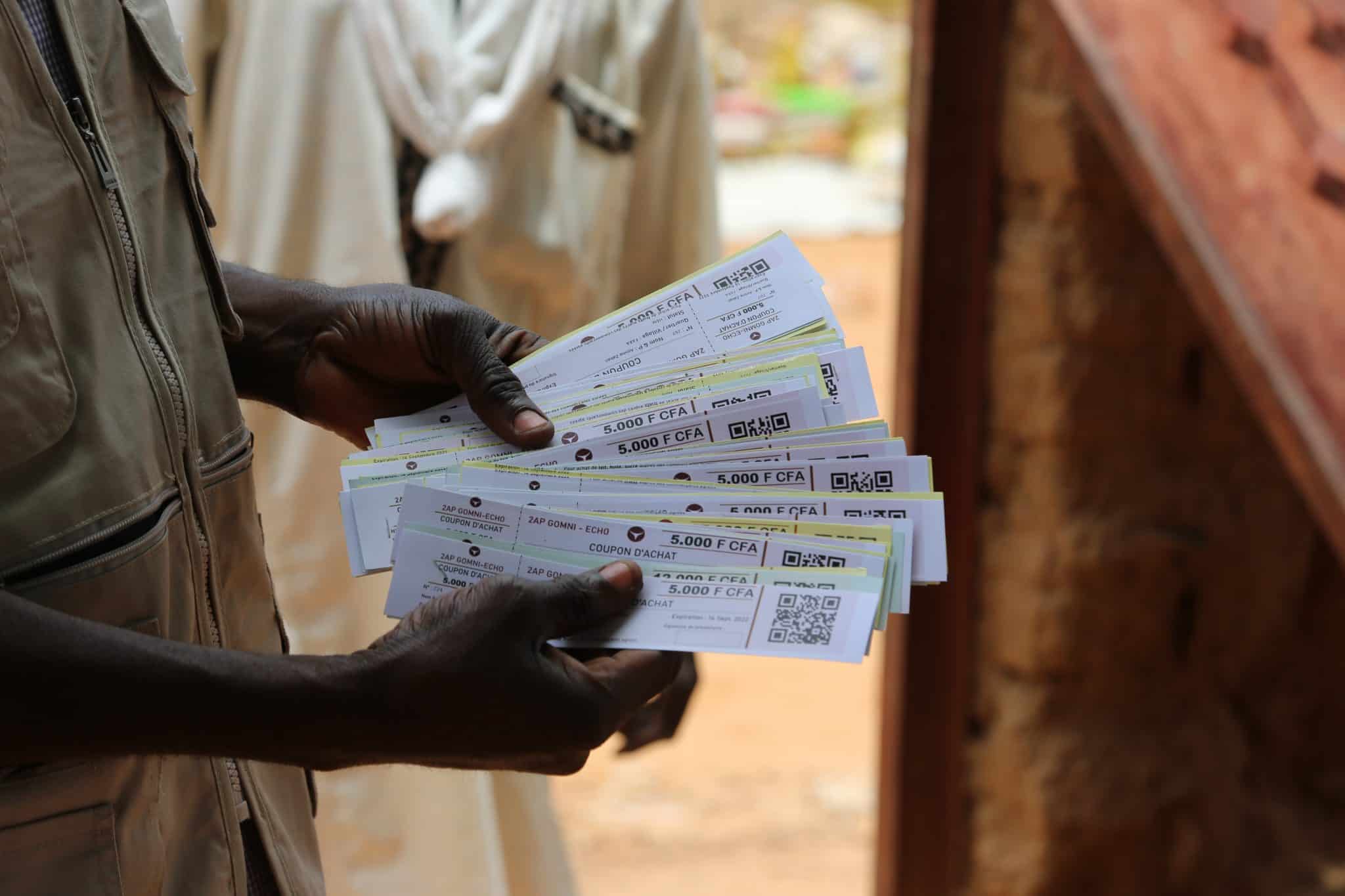
Each beneficiary of assistance from Vétérinaires Sans Frontières Belgium received 3 vouchers: one for fruit, one for cereals and one for sugar, milk and oil © 2SCOM
“In distributing these food kits, our objective is to allow everyone to meet their nutritional needs according to the international standard of 2100 kcal per person per day. More generally speaking, the aim of our activities is to improve the daily lives of the beneficiaries directly. The displaced families and their hosts are going through a very difficult period. When they arrive in the refuge area, the displaced people do not know anyone and have no source of income. They have no means of buying food for themselves.
Our coupons deal with one of their major problems, which is access to nutrition. The composition of the kit, which includes milk, sugar and fruit for children, enables them to diversify their diets as well. The distributions are also very useful for the few people who have managed to flee with a goat or a few chickens. The food they receive means that they do not have to sell their only source of income to buy something to eat.”
Has the operation met the needs of the target populations effectively?
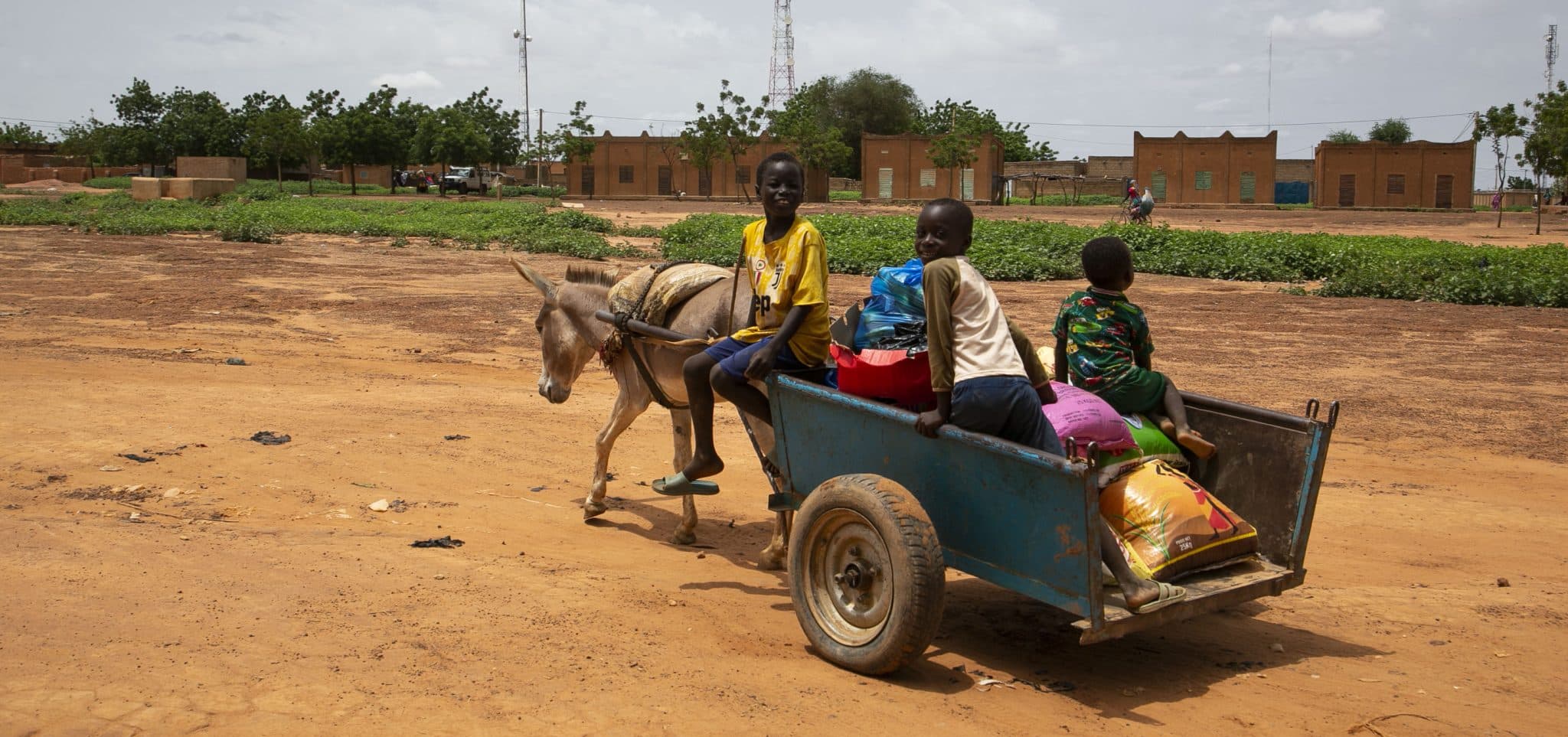
Children return home with food distributed by Vétérinaires Sans Frontières Belgium, in south-western Niger. © 2SCOM
“After the third and final distribution, we conducted a satisfaction survey among 280 households, based on a random sample.
According to the survey, 99% of the beneficiaries interviewed are entirely satisfied. The others report being somewhat satisfied, and brought to light possible improvements in terms of communication. For example, certain people were not properly informed of the number of distributions, and others pointed out that the tents provided to shade people from the sun were not sufficient. Our team have taken these comments into account, and we will make sure to improve these aspects in the next similar operations. We have also set up a toll-free hotline so that beneficiaries can pass on their complaints or positive impressions. That will also enable us to improve our practices.”
 Our distribution of food kits for the benefit of displaced and host agropastoralist populations in south-western Niger took place in the summer of 2022, with support from the European Union (DG-ECHO). We have been active in the Sahel, and specifically in Niger, since 1997, supporting communities that rely on livestock keeping with the intention of improving their well-being and strengthening their resilience to shocks.
Our distribution of food kits for the benefit of displaced and host agropastoralist populations in south-western Niger took place in the summer of 2022, with support from the European Union (DG-ECHO). We have been active in the Sahel, and specifically in Niger, since 1997, supporting communities that rely on livestock keeping with the intention of improving their well-being and strengthening their resilience to shocks.

